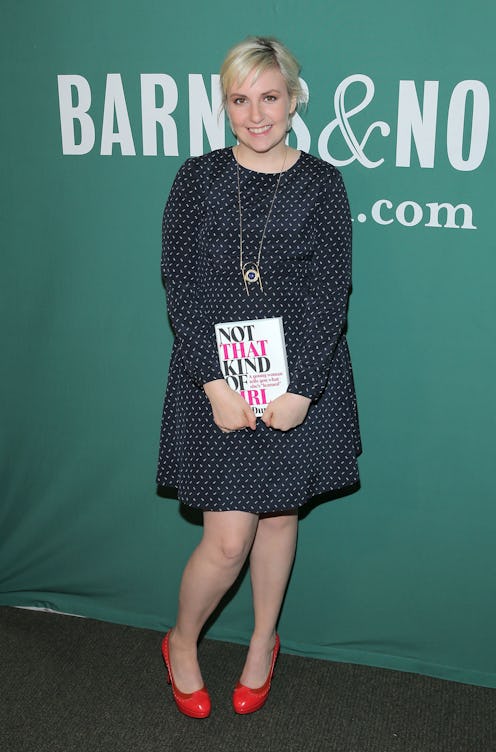Books
Publisher To Make Changes To Lena's Rape Essay
Though at first glance, it's seemingly harmless, the story behind a change to Lena Dunham's memoir may show major underlying issues. After threat of litigation, Dunham's publisher Random House has agreed to adjust Not That Kind of Girl to indicate that the name "Barry" is a pseudonym. "Barry" is the titular name of the essay in which Dunham describes a night she was raped. Dunham's description of Barry — as a mustachioed campus Republican — lines up with an Oberlin alumnus named Barry, who claims that although he has never met Dunham, he is receiving threats and allegations against him.
This Barry set up a GoFundMe account to support his legal fees, but in the agreement, Random House says it's ready to pay for those, and offers another place he can send that money. The page has raised close to $25,000 of its $100,000 goal.
As indicated on the copyright page of Not That Kind of Girl by Lena Dunham, some names and identifying details in the book have been changed. The name "Barry" referenced in the book is a pseudonym. Random House, on our own behalf and on behalf of our author, regrets the confusion that has led attorney Aaron Minc to post on GoFundMe on behalf of his client, whose first name is Barry.
We are offering to pay the fees Mr. Minc has billed his client to date. Our offer will allow Mr. Minc and his client to donate all of the crowd-funding raised to not-for-profit organizations assisting survivors of rape and sexual assault.
If you've been following along with the (seemingly endless) controversy surrounding Dunham's Not That Kind of Girl, you know this issue was raised earlier this fall. National Review writer Kevin D. Williamson railed against Dunham's "Barry" essay in his piece "Pathetic Privilege: The Coming of Age of Lena Dunham." It was Williamson's fact-checking in the first place that found the Oberlin alumna Barry, and he determined that her writing the essay naming his name was irresponsible:
Dunham’s writing all this is, needless to say, a gutless and passive-aggressive act ... Barry is not a character in a book; he is a real person, one whose life is no doubt being turned upside down by a New York Times No. 1 best-seller containing half-articulated accusations that he raped a woman in college, accusations that are easily connected to him.
Then, earlier this month, Brietbart writer John Nolte wrote about how Dunham's accusations "fall apart under scrutiny." So yes, it wasn't Dunham, Random House, or anyone on her team that pinpointed this Barry of Oberlin college as Dunham's rapist; journalists who opposed Dunham's essay for just this reason were responsible for "outing" the campus Republican and sparking the controversy.
Both Nolte's and Williamson's pieces also barely cloak underlying misogyny and serious problems with how rape survivors are treated in our society; Nolte, for example, seems far more concerned that Dunham did not report the rape back in college than whether a young woman was raped. Both men describe the severe harm that Barry has had to suffer through in the aftermath of Dunham's essay. It would help to maybe remind Williamson of his own words: Dunham, too, "is not a character in a book; [she] is a real person."
Dunham has yet to comment on whether "Barry" was a pseudonym or her thoughts on the altered copies of her memoir.
